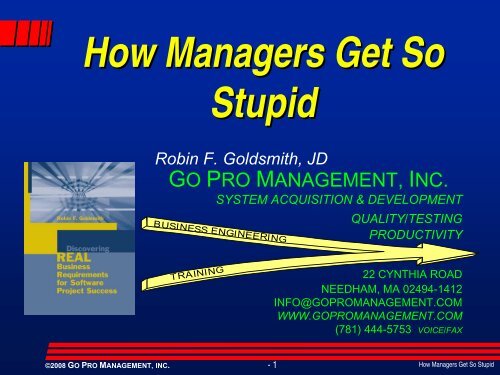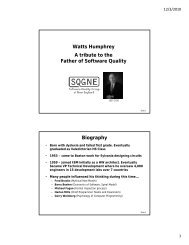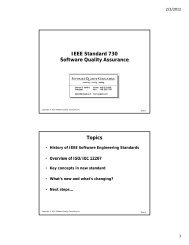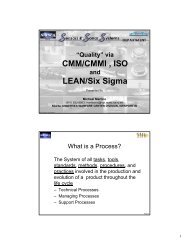How Managers Get So Stupid - sqgne
How Managers Get So Stupid - sqgne
How Managers Get So Stupid - sqgne
You also want an ePaper? Increase the reach of your titles
YUMPU automatically turns print PDFs into web optimized ePapers that Google loves.
<strong>How</strong> <strong>Managers</strong> <strong>Get</strong> <strong>So</strong><br />
<strong>Stupid</strong><br />
Robin F. Goldsmith, JD<br />
GO PRO MANAGEMENT, INC.<br />
SYSTEM ACQUISITION & DEVELOPMENT<br />
BUSINESS ENGINEERING<br />
QUALITY/TESTING<br />
PRODUCTIVITY<br />
TRAINING<br />
22 CYNTHIA ROAD<br />
NEEDHAM, MA 02494-1412<br />
INFO@GOPROMANAGEMENT.COM<br />
WWW.GOPROMANAGEMENT.COM<br />
(781) 444-5753 VOICE/FAX<br />
©2008 GO PRO MANAGEMENT, INC.<br />
-1<br />
<strong>How</strong> <strong>Managers</strong> <strong>Get</strong> <strong>So</strong> <strong>Stupid</strong>
My Boss Is an Idiot<br />
Is Your Boss an Idiot Too?<br />
Boneheaded bosses aren’t just in Dilbert* or on<br />
“The Office”<br />
But, I’m self-employed!<br />
* P.S. Why I don’t include cartoons in my talks any more<br />
©2008 GO PRO MANAGEMENT, INC.<br />
-2<br />
<strong>How</strong> <strong>Managers</strong> <strong>Get</strong> <strong>So</strong> <strong>Stupid</strong>
Objectives<br />
• Describe some (probably too) familiar situations<br />
where managers seem to act stupid<br />
• Suggest some possible reasons why formerly<br />
capable people turn stupid, or at least appear to<br />
• Encourage ideas about how to deal with it<br />
(before we get stupid too)<br />
©2008 GO PRO MANAGEMENT, INC.<br />
-3<br />
<strong>How</strong> <strong>Managers</strong> <strong>Get</strong> <strong>So</strong> <strong>Stupid</strong>
Employees’ Own Ranking of Workplace Needs vs.<br />
What Their Supervisors Thought Workers Said<br />
PC Week Feb. 3, 1997<br />
Employees <strong>Managers</strong><br />
Interesting work 1 5<br />
Full appreciation for work done 2 8<br />
Feeling “in on things” 3 10<br />
Job security 4 2<br />
Good wages 5 1<br />
Promotions/growth opportunities 6 3<br />
Good working conditions 7 4<br />
Personal loyalty to workers 8 6<br />
Tactful disciplining 9 7<br />
Sympathetic help with personal problems 10 9<br />
©2008 GO PRO MANAGEMENT, INC.<br />
-4<br />
<strong>How</strong> <strong>Managers</strong> <strong>Get</strong> <strong>So</strong> <strong>Stupid</strong>
From Superworker<br />
To Supervisor<br />
To Superfluous<br />
©2008 GO PRO MANAGEMENT, INC.<br />
-5<br />
<strong>How</strong> <strong>Managers</strong> <strong>Get</strong> <strong>So</strong> <strong>Stupid</strong>
I Must Be Right,<br />
Making Me Boss Says <strong>So</strong><br />
• Organizations reinforce perpetuated cycles of<br />
– Ineffective behaviors (consider boss’ role models’ skills)<br />
– Presumption that title reflects and bestows good judgment<br />
• Boss either<br />
– Is aware but afraid to acknowledge doubts<br />
– Believes own P.R. (by far the more difficult to deal with)<br />
• Regardless, cultural pressure to act as if right<br />
– Can’t acknowledge insufficient knowledge (or, heaven forbid,<br />
inadequate judgment), threatens one’s authority<br />
– Can’t even attend training any more, at least not with the troops<br />
(now can learn only in elegant surroundings with other bosses)—<br />
image that bosses are different Have you become your parents?<br />
©2008 GO PRO MANAGEMENT, INC.<br />
-6<br />
<strong>How</strong> <strong>Managers</strong> <strong>Get</strong> <strong>So</strong> <strong>Stupid</strong>
Why Would a Boss Impose an<br />
“Unrealistic” Budget/Schedule?<br />
Boss fails when you fail<br />
• Just passing along legal or<br />
business constraints<br />
• Misunderstands work<br />
– Need for requirements, testing, etc.<br />
– Seems simple<br />
– “Double whammy” rule of thumb<br />
• Doesn’t believe your points<br />
– We’re not really clear in our own<br />
minds on why, what, how<br />
– Our assumptions are not shared<br />
– Links to quality don’t register<br />
©2008 GO PRO MANAGEMENT, INC.<br />
-7<br />
<strong>How</strong> <strong>Managers</strong> <strong>Get</strong> <strong>So</strong> <strong>Stupid</strong>
Why Bosses Cut Your Estimates<br />
• Establish urgency, counter<br />
perception that engineers “cry<br />
wolf” and never finish<br />
• Create “motivation”<br />
• Halving your double<br />
• Challenge Parkinson’s Law—<br />
Work expands to fill the<br />
available time<br />
• Perceives you don’t have any<br />
real idea, so boss’ guess is<br />
just as good<br />
Would you argue with an<br />
airline about how long a<br />
flight takes? Why not?<br />
©2008 GO PRO MANAGEMENT, INC.<br />
-8<br />
<strong>How</strong> <strong>Managers</strong> <strong>Get</strong> <strong>So</strong> <strong>Stupid</strong>
Neither Estimates nor Estimators<br />
Have Relevance or Credibility When<br />
• Estimates are based on not delivering<br />
fully what is needed, usually because<br />
the “estimates” aren’t even thought of as<br />
estimates, but rather are just a set of<br />
albeit well-intentioned (“trust me, I’m a<br />
professional,” “I’m just being realistic”)<br />
statements that I will not deliver fully<br />
what you need<br />
• Makes you part of the problem instead<br />
of part of the solution<br />
• You will not find a way to deliver<br />
©2008 GO PRO MANAGEMENT, INC.<br />
-9<br />
<strong>How</strong> <strong>Managers</strong> <strong>Get</strong> <strong>So</strong> <strong>Stupid</strong>
Credibility Starts with Successful End<br />
• Estimator reasonably knows<br />
– What is needed in business terms<br />
– <strong>How</strong> to make full delivery happen, where<br />
actions are tied clearly to results<br />
– What it will take, manage by facts, empower<br />
• Estimator is committed to make it happen,<br />
which opens you to seeing ways to succeed;<br />
otherwise you see only ways to fail<br />
Commitment to Delivering Results is top Critical Success Factor<br />
Not simply caring or working hard, though both are necessary.<br />
Projects succeed or fail in the first 15 minutes!<br />
©2008 GO PRO MANAGEMENT, INC.<br />
-10<br />
<strong>How</strong> <strong>Managers</strong> <strong>Get</strong> <strong>So</strong> <strong>Stupid</strong>
Impeding Use of Learning<br />
Wrong time, wrong folks—”They won’t let us use it”<br />
• Manager doesn’t know the lessons, of<br />
course, or recognize applicability to him/her<br />
– Meaningful improvement involves doing<br />
something different (from behaviors that<br />
manager was rewarded/promoted for)<br />
– Must see objectively how and why things are<br />
now (that warrant improvement; and nobody<br />
wants to)<br />
• Effectiveness of training is measured by<br />
survey (popularity poll) or test (maybe<br />
worse?)<br />
©2008 GO PRO MANAGEMENT, INC.<br />
-11<br />
<strong>How</strong> <strong>Managers</strong> <strong>Get</strong> <strong>So</strong> <strong>Stupid</strong>
Making Work Hell<br />
• Poor management (often actually poor<br />
leadership, or both) is the main reason people<br />
leave a job<br />
• The primary cause of poor performance by an<br />
individual is that individual’s manager, but<br />
individual is one blamed<br />
• Confusing management and title with leadership;<br />
confusing intent with results<br />
A survey found that 75 percent of managers felt<br />
they were in the top 10 percent in leadership.<br />
-- Brian Tracy<br />
©2008 GO PRO MANAGEMENT, INC.<br />
-12<br />
<strong>How</strong> <strong>Managers</strong> <strong>Get</strong> <strong>So</strong> <strong>Stupid</strong>
“<strong>Managers</strong> and Leaders: Are They Different?”<br />
<strong>Managers</strong><br />
• Use power to direct other people<br />
• Attitudes toward goals are impersonal, passive,<br />
reactive to necessity<br />
• Conceive work as process to conserve and regulate<br />
existing order, limit choices, and have conflicting<br />
values accept solutions<br />
• Relations with others according to roles,<br />
communicates indirectly and with low level of<br />
emotional involvement, seeking win-win<br />
Abraham Zeleznik<br />
Harvard Business Review May-June 1977<br />
©2008 GO PRO MANAGEMENT, INC.<br />
-13<br />
<strong>How</strong> <strong>Managers</strong> <strong>Get</strong> <strong>So</strong> <strong>Stupid</strong>
“<strong>Managers</strong> and Leaders: Are They Different?”<br />
Leaders<br />
• Use power to influence other people<br />
• Attitudes toward goals are personal, active,<br />
shaping to achieve desires<br />
• Conceive work in terms of new options and ideas<br />
that excite people to develop choices<br />
• Relations with others are more emotionally intuitive<br />
and empathetic, incur love or hate, often intense<br />
one-to-one and mentoring<br />
Abraham Zeleznik<br />
Harvard Business Review May-June 1977<br />
©2008 GO PRO MANAGEMENT, INC.<br />
-14<br />
<strong>How</strong> <strong>Managers</strong> <strong>Get</strong> <strong>So</strong> <strong>Stupid</strong>
Leadership Effectiveness Is Seen<br />
by Its Results--<br />
--Impact on:<br />
Participation<br />
Commitment<br />
Enthusiasm<br />
Pride<br />
Effort<br />
Perseverance<br />
Morale<br />
Making Changes<br />
Not by One’s Actions or Intent<br />
©2008 GO PRO MANAGEMENT, INC.<br />
-15<br />
<strong>How</strong> <strong>Managers</strong> <strong>Get</strong> <strong>So</strong> <strong>Stupid</strong>
Leader Behaviors<br />
Leader Behaviors<br />
‣ Take initiative, take action<br />
‣ See the need for a solution and leadership, see/find opportunity<br />
‣ Set the vision to take the opportunity<br />
‣ Set goals to accomplish the vision<br />
‣ Communicate the vision and goals<br />
‣ Inspire, motivate, and influence others to make commitment to<br />
the vision and goals<br />
‣ Encourage and enable taking action<br />
‣ Keep people focused, energized, persevering, and on track with<br />
respect to vision and goals<br />
‣ Create the environment for leadership<br />
‣ Direct, coach, delegate, support, lead the way<br />
‣ Know when to follow<br />
‣ Set the example, walk the talk<br />
Do the right thing vs. Do things right<br />
©2008 GO PRO MANAGEMENT, INC.<br />
-16<br />
<strong>How</strong> <strong>Managers</strong> <strong>Get</strong> <strong>So</strong> <strong>Stupid</strong>
People Who Think They Are Leaders, But<br />
In Fact Are Not, Can Have Negative Effect<br />
<br />
<br />
<br />
Don’t recognize needs for true leadership behaviors<br />
Impose their own, non-leadership behaviors that are very<br />
likely to be creating the situation that needs leadership<br />
behaviors<br />
When in a position of power, often interfere with others’<br />
efforts to exhibit leadership behaviors<br />
Effective managers assure good leadership is present,<br />
even if they don’t/can’t provide it personally<br />
©2008 GO PRO MANAGEMENT, INC.<br />
-17<br />
<strong>How</strong> <strong>Managers</strong> <strong>Get</strong> <strong>So</strong> <strong>Stupid</strong>
Summary<br />
• We are all probably too familiar with managers who<br />
seem to act stupid<br />
– Dooming projects with budgets/schedules<br />
– “They” won’t let us use our learning<br />
– Failing to provide good leadership<br />
• “We is met the enemy, and they is us.”*<br />
Organizations, managers themselves, and the rest of<br />
us all make formerly capable people turn stupid or<br />
appear to<br />
• Realize your own responsibility for results, show<br />
learning’s effects, and be a leader<br />
*Pogo<br />
©2008 GO PRO MANAGEMENT, INC.<br />
-18<br />
<strong>How</strong> <strong>Managers</strong> <strong>Get</strong> <strong>So</strong> <strong>Stupid</strong>
Go Pro Management, Inc. Seminars--Relation to Life Cycle<br />
Systems QA <strong>So</strong>ftware Quality Effectiveness Maturity Model<br />
Credibly Managing Projects and Processes with Metrics<br />
System Measurement ROI Test Process Management<br />
Feasibility<br />
Analysis<br />
Systems<br />
Analysis<br />
Defining and Managing<br />
User Requirements<br />
Proactive User Acceptance Testing<br />
Reusable Test Designs<br />
System<br />
Design<br />
Testing Early in the Life Cycle<br />
Test Estimation<br />
Writing Testable SW Requirements Risk<br />
Re-Engineering: Opportunities for IS Analysis<br />
21 Ways to Test Requirements<br />
Making You a Leader<br />
Development<br />
Implementation<br />
Operations<br />
Maintenance<br />
Proactive Testing:<br />
Risk-Based Test Planning,<br />
Design, and Management<br />
Managing <strong>So</strong>ftware Acquisition and Outsourcing:<br />
> Purchasing <strong>So</strong>ftware and Services<br />
> Controlling an Existing Vendor’s Performance<br />
©2008 GO PRO MANAGEMENT, INC.<br />
-19<br />
<strong>How</strong> <strong>Managers</strong> <strong>Get</strong> <strong>So</strong> <strong>Stupid</strong>
Robin F. Goldsmith, JD<br />
robin@gopromanagement.com (781) 444-5753<br />
www.gopromanagement.com<br />
• President of Go Pro Management, Inc. consultancy since 1982, working directly with and training<br />
professionals in business engineering, requirements analysis, software acquisition, project management,<br />
quality and testing.<br />
• Partner with ProveIT.net in REAL ROI and ROI Value Modeling.<br />
• Previously a developer, systems programmer/DBA/QA, and project leader with the City of Cleveland,<br />
leading financial institutions, and a “Big 4” consulting firm.<br />
• Degrees: Kenyon College, A.B.; Pennsylvania State University, M.S. in Psychology; Suffolk University,<br />
J.D.; Boston University, LL.M. in Tax Law.<br />
• Published author and frequent speaker at leading professional conferences.<br />
• Formerly International Vice President of the Association for Systems Management and Executive Editor<br />
of the Journal of Systems Management.<br />
• Founding Chairman of the New England Center for Organizational Effectiveness.<br />
• Member of the Boston SPIN and SEPG’95 Planning and Program Committees.<br />
• Chair of BOSCON 2000 and 2001, ASQ Boston Section‘s Annual Quality Conferences.<br />
• Member ASQ <strong>So</strong>ftware Division Methods Committee.<br />
• Member IEEE Std. 829 for <strong>So</strong>ftware Test Documentation Standard Revision Committee<br />
• International Institute of Business Analysis (IIBA) Business Analysis Body of Knowledge subject expert.<br />
• Admitted to the Massachusetts Bar and licensed to practice law in Massachusetts.<br />
• Author of book: Discovering REAL Business Requirements for <strong>So</strong>ftware Project Success<br />
©2008 GO PRO MANAGEMENT, INC.<br />
-20<br />
<strong>How</strong> <strong>Managers</strong> <strong>Get</strong> <strong>So</strong> <strong>Stupid</strong>






